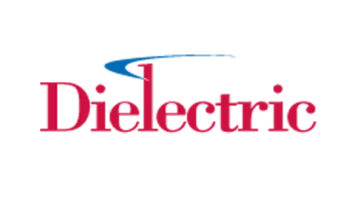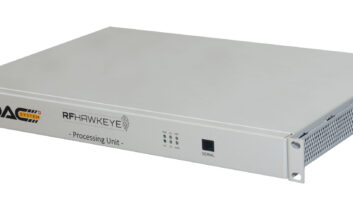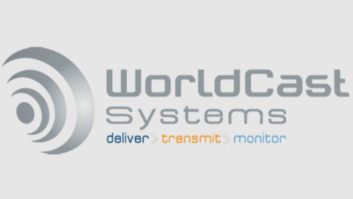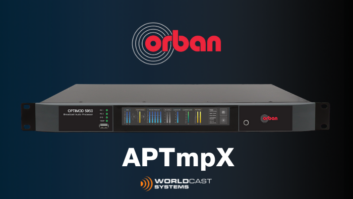Ratings Firms Race to Build the Better Radio Measurement Mousetrap
HOUSTON: Three companies are fighting to build radio’s next preferred ratings system.
Hoping to foster the launch of commercial implementation of a new system in at least some markets by the end of the year, a group of radio owners and other users of listener data continues to examine proposals from the finalists.
Each proponent is offering not only a technology but also services in collecting and compiling results, as Arbitron does now with its diary data. Thus the three companies are fighting for radio’s great research prize: dominance of the ratings market, long enjoyed by Arbitron.
While much has been written here about Arbitron’s Portable People Meter over the years of its development, its competitors for the endorsement of the “Next-Generation Electronics Ratings Evaluation Team” are less familiar.
However, The Media Audit and Mediamark are hardly unknowns when it comes to media research. Each hopes its electronic audience research system eventually will be chosen to replace Arbitron’s paper diary system, introduced in 1965.
The “Next-Generation Electronics Ratings Evaluation Team” includes radio companies, ad agencies and a radio advertiser, Ford Motor Company. The broadcast members are ABC, Bonneville, CBS Radio, Clear Channel Radio, Cox Radio, Cumulus, Emmis, Entercom, Entravision, Greater Media, Journal, Radio One, Regent and Susquehanna.
Clear Channel last summer publicized a Request for Proposal for a radio electronic ratings service; that step started the evaluation process. The company sought to exhaust all possibilities for electronic measurement; it received 34 proposals.
The evaluation team earlier this year selected the finalists from seven semi-finalists announced in December.
While no single entity can give the entire industry’s endorsement to one system or research provider, the finding of the evaluation team is considered to be the closest thing. Experts believe an industry standard for an electronic ratings system will be necessary because ad buyers have indicated a preference to one recognizable, consistent baseline.
The Media Audit and Mediamark Research have pitched tech-savvy systems they say will provide more accurate radio listener data than Arbitron’s diary methodology or its proposed PPM.
‘Smart phone’
Executives James Higginbotham and Robert Jordan co-founded International Demographics, which owns Media Audit, in 1971. It currently has 200 employees in Houston.
The company’s primary product is The Media Audit, a multimedia qualitative audience survey conducted in more than 80 markets. Clients include radio stations, television broadcasters, cable television operators, daily newspapers, outdoor media, advertising agencies and advertisers.
Media Audit is proposing a smart cell phone device it is developing with Ipsos, a U.K.-based media research firm. The smart phone has an advanced operating system, similar to that of a computer, that allows it to add features as a personal digital assistant would.
Panel participants would carry a smart cell phone for an undetermined length of time while it tracks their listening automatically. For convenience, company officials say participants could keep their old cell phone number and import their former cell phone address book. The smart phones would be collected once the monitoring period is completed, anywhere from one to three years.
Company officials say the high-end cell phone tracks media exposure to watermarked-encoded audio signals or by audio-matching signals that are not encoded.
“We have a piece of research hardware that can check e-mail, browse the Web, schedule meetings, plays MP3s, take photos, make phone calls and electronically track radio listening habits,” said Phil Beswick, executive vice president for The Media Audit.
It’s that “all-in-one” integrated aspect that will allow The Media Audit to monitor consumers’ behaviors as unobtrusively as possible, he believes.
“You need compliance, and in order to do that you have to make measurement as least as onerous as possible. Compliance leads to fair and reliable data of radio listening,” Beswick said. “A smart phone with many features becomes indispensable and therefore is taken everywhere.”
The ‘encode’
The Media Audit believes using the smart cell phone as a measurement device will satisfy the research needs of radio into the future, Beswick said.
“The cell phone is the fastest-growing consumer product ever. It’s not going the way of the pager. Research shows that over 80 percent of all adults now carry cell phones, and approximately 5 percent own smart phones. We expect that within a few years the majority of cell phones sold will be smart phones,” Beswick said.
The smart phone samples sound from the ambient audio environment through the microphone every several seconds, Beswick said, then searches in its listening process for the “encode,” similar to an “audio barcode” within the broadcast signal. The data is time-stamped and stored in the memory of the operating system. Approximately every five minutes, data packets are sent to The Media Audit’s data center in Houston via the General Packet Radio Service (GPRS), a mobile data service available to mobile phone users.
“The smart phone will mimic the listening range of the human ear,” Beswick said, therefore accurately representing what a person would hear.
The Media Audit’s smart phone system will have built-in data redundancy through its signal matching capabilities, Beswick said.
“The fact is both audio-matching and encoding have their respective strengths. Indeed their strengths complement each other. For this reason we favor integrating both monitoring systems in our smart cell phone solution,” Beswick said.
The Media Audit expected to launch an “expert witness test” in Houston this May – the same market in which Arbitron is testing its Portable People Meter – with test results to be shared with the radio industry later in the month.
The panel will include several dozen people equipped with smart cell phones. The participants will log their listening in a paper diary, which will later be compared to electronically gathered data, Beswick said.
Beswick said the company expects to conduct a smart phone field test of 2,500 respondents in Houston later this year, which will also check parameters to determine response rates.
Total cost of the field test is expected to top $5.5 million. The Media Audit will look to the radio industry to fund a majority of the field test, he said.
Media Audit says it has commitments from radio stations representing about “95 percent of the radio revenue” in the Houston market to encode their signals for smart phone testing.
That includes Cox Radio and Radio One stations, both of which have steadfastly refused to encode their broadcasts for Arbitron’s PPM tests. Arbitron has said it expects Cox and Radio One to encode for the PPM if the technology wins the accreditation race.
The Media Audit initially would provide smart cell phones to those on its passive electronic measurement system panels, which will add to the cost of conducting the research. “However, we expect as time goes on our hardware costs will go way down as more and more people purchase smart phones.”
Sample sizes will be approximately 2,000-2,500 for persons ages 12+ in markets such as Atlanta, Detroit, Miami and Houston.
“We believe sample size will have to grow with the increased media fragmentation as a result of (multicasting with) HD Radio, which could result in double or triple the number of local radio operations in some markets. Larger panels will yield more reliable research despite the expanding number of radio signals,” Beswick said.
The costs for radio stations will go up a bit compared to the diary methodology, Beswick said, but will be a lot less than what Arbitron wants to charge for PPM.
Arbitron has contract proposals out to stations that would increase measurement costs from some 40 percent to 60 percent, depending on the products purchased, as previously reported in Radio World.
If eventually given the go-ahead, Media Audit said it is willing to commit to deployment of its smart cell phone audience measurement system in 11 markets in 2007.
Arbitron will begin using PPM for real data collection in top markets starting with Houston this July and continuing in the top 10 markets by fall 2008; it plans to expand to the top 50 markets two to three years after that.
The Eurisko
Arbitron’s other rival for America’s electronic ratings system business comes from Mediamark Research.
Mediamark is a subsidiary of GfK Holdings, a Nuremberg, Germany-based market research company. Mediamark collects and analyzes data on consumer demographics, product and brand usage, and exposure to forms of advertising media. It has approximately 75 employees at its U.S. office in New York City.
Its entry into the three-way ratings race is based on the Eurisko Media Monitor, developed by sister company Eurisko, an Italian marketing research institute. The company has made few public comments during the evaluation process.
The Eurisko device uses sound matching technology, which compares snippets of captured audio to electronically monitored broadcasts, said Jay Mattlin, Mediamark Research vice president for research and new ventures.
“The device has a microphone that picks up ambient sound. A fingerprint of that sound is stored and later compared to audio files from broadcast services. Our huge advantage is that we do not rely on the cooperation of the broadcasters. Audio does not have to be encoded, so we are not reliant on all radio stations participating,” Mattlin said.
Panel participants will wear the cell-phone-sized Eurisko Media Monitor, which has a microphone to capture audio of the radio transmissions that panelists are exposed to, Mattlin explained.
Mattlin said the Eurisko Media Monitor has gone through validity testing by Radio Advertising Joint Audience Research, which has been comparing PPM and the Eurisko device for rollout in the U.K.
“The RAJAR simulation test deemed both the Media Monitor and PPM as acceptable potential measurement tools. However, we do feel we have advantages over PPM, including longer battery life and a more appealing-looking device,” Mattlin said.
Arbitron has said it has increased the battery life of the PPM significantly.
Mediamark Research believes smart phone technology is “not quite as far along” as the Eurisko, and there are other drawbacks to the smart phone, Mattlin said.
“We believe if you give people a smart phone, their media usage will change. For instance, they could start playing MP3s or downloading other content from the Web. A measurement device should not impact the way media is consumed. You would no longer be measuring true behavior.”
(The Media Audit’s Beswick said the research firm could “turn off” any smart phone software features, like MP3 players, that are determined to affect radio listening adversely.)
Mediamark Research officials met with members of the MRC evaluation team in March and pitched the Eurisko Media Monitor. However, there are no major field tests planned in the United States. As proof of performance, they point to the RAJAR testing in the U.K. as evidence that the Eurisko Media Monitor is a worthy candidate in the United States.
Conducting a test in this country “is up to the ratings evaluation team,” said Mattlin. “The radio industry would need to step forward and say, ‘We want a test,’ and fund it as well. We would be happy to engage in such a test.”
‘Grueling’ accreditation
Meanwhile, Arbitron officials say both The Media Audit and Mediamark are offering only concepts of electronic measurement services and have not conducted credible testing.
“Not a single claim of theirs has been backed up by research among consumers here in the United States,” said Thom Mocarsky, vice president of communications for Arbitron.
“We have had three market trials in the U.S. and are in the middle of the evaluation team’s audit. We have gone through a grueling accreditation process. We expect the radio industry to be as diligent with the rest in the field.”
Mediamark’s Mattlin acknowledged that Arbitron is the incumbent and has the “advantage of deep knowledge of the industry and the players” within the industry.
Two of the finalists also have addressed the cell phone-only household issue. Arbitron and The Media Audit say they will incorporate cell phone-only households in their samples.
Arbitron says it will recruit panelists by calling cell phones starting in 2008. Media Audit officials say they will draw samples of cell phone-only households if chosen to provide electronic ratings.
Empirical
So what will the outcome be?
Several radio consultants contacted for this story said competition is good for any business, including Arbitron. However, it’s fairly clear that Arbitron remains the ratings race leader to this point in their minds.
“Arbitron has needed an upgrade from the diary for a long time. They obviously know that. Because of their tests with the PPM the past few years I believe they are in the lead,” said Ed Shane, president of Shane Media. “However, it’s pretty clear that Clear Channel and others would like to see Arbitron’s lead at least challenged.”
Shane looks for The Media Audit and Mediamark to proceed with rigorous testing of their electronic radio rating systems.
“The industry deserves empirical data,” Shane said. “I think we need to mix our data gathering. I’ve always been a fan of mixed methodologies to gain understanding from even the most recalcitrant respondent.”
Holland Cooke, president of Holland Cooke Media, said, “It’s hard to imagine Arbitron’s PPM not emerging as the standard. They are much further down the road.”
Cooke also said he has more knowledge of the PPM than the competitors’ offerings because of various industry briefings on the technology. “Arbitron has been tweaking PPM with input from consultants, stations programmers, the ad community and other stakeholders. That has a lot of value.”
But at least one radio consultant thinks it is a wide open race, thanks in part to the refusal of Cox Media and Radio One to encode their Houston stations for inclusion in Arbitron’s PPM testing.
“I believe that, combined with Arbitron’s failure to guarantee current clients a start at no rate increase, really has opened the door for The Media Audit and Mediamark. Plus, I really admire Clear Channel for jumpstarting the process,” said Jaye Albright, partner with Albright & O’Malley Country Consulting/Radio IQ.
Albright said the various technologies being touted makes it seem at times as if there is no perfect system available.
“I believe the industry will have to compare them all and agree on what compromises are most effective for all parties involved.”












